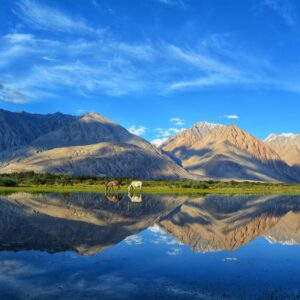Zanzibar, an enchanting archipelago situated off the coast of Tanzania in East Africa, is a world-renowned destination known for its idyllic beaches, rich culture, and vibrant history. But beyond its picturesque shorelines lies an underwater paradise that attracts scuba diving enthusiasts from all over the globe. zanzibar scuba diving offers an incredible opportunity to explore pristine coral reefs, encounter diverse marine species, and experience the warm Indian Ocean like never before.
In this comprehensive guide, we will dive deep into why Zanzibar is a diver’s dream, highlight the best dive sites, explore the abundant marine life, discuss the best times to dive, and provide useful tips to help you plan an unforgettable scuba diving adventure.
Why Zanzibar is a Premier Diving Destination
Zanzibar’s unique location in the Indian Ocean grants it access to some of the richest marine ecosystems on the planet. The region’s warm waters—averaging between 25°C and 29°C (77°F to 84°F)—make diving comfortable year-round, while the excellent underwater visibility (often 15 to 30 meters or more) allows for crystal-clear views of the coral reefs and their inhabitants.
Another reason Zanzibar shines as a scuba diving hotspot is its status as a marine conservation hub. Many of its reefs, including those around Mnemba Atoll and Menai Bay, are protected marine reserves where fishing is restricted and coral ecosystems are carefully preserved. This protection has fostered healthy reefs teeming with life, creating ideal conditions for divers.
Top Zanzibar Dive Sites to Explore
Mnemba Atoll
Mnemba Atoll is undoubtedly Zanzibar’s crown jewel when it comes to scuba diving. This circular reef structure forms a protected marine reserve and boasts a wide variety of dive sites, from shallow coral gardens to deeper walls and swim-through caves. Divers will encounter colorful hard and soft corals, sea turtles gracefully gliding through the water, schools of vibrant reef fish, and sometimes even dolphins or reef sharks.
Leven Bank
For more experienced divers, Leven Bank offers thrilling drift dives with the possibility of encountering larger pelagic species like hammerhead sharks, eagle rays, and barracudas. Located north of Zanzibar Island, the site is known for strong currents, which add an exhilarating element to the dive while bringing nutrient-rich waters that sustain abundant marine life.
Tumbatu Island
Less crowded and tranquil, Tumbatu Island’s reefs are perfect for beginners and intermediate divers. Its shallow reefs host a variety of soft corals, clownfish, angelfish, and other tropical fish. The calm conditions here make it an ideal spot for those looking to enjoy relaxed dives in a beautiful natural setting.
Pange Island
Pange Island offers a mix of gentle slopes and coral gardens, attracting sea turtles, moray eels, and myriad fish species. The shallow waters make this site accessible for snorkelers as well as divers seeking less challenging dives.
Marine Biodiversity of Zanzibar’s Reefs
Zanzibar’s underwater world is alive with an impressive diversity of marine species, making it an exciting destination for underwater photographers and marine enthusiasts. Some of the key species divers can expect to encounter include:
-
Sea Turtles: Both green turtles and hawksbill turtles are frequent visitors, often seen feeding on seagrass beds or resting on the reef.
-
Reef Sharks: Blacktip and whitetip reef sharks patrol the coral reefs, usually harmless to divers but fascinating to watch.
-
Manta Rays and Eagle Rays: Graceful rays glide through the water, often spotted at cleaning stations or open waters.
-
Colorful Reef Fish: Parrotfish, butterflyfish, angelfish, clownfish, damselfish, and many more brighten the reefs with vivid colors and diverse behaviors.
-
Other Creatures: Octopuses, nudibranchs, moray eels, lionfish, and anemones add to the rich tapestry of marine life.
During certain seasons, lucky divers may also spot large pelagic visitors like whale sharks and dolphins, further adding to the excitement.
When is the Best Time to Dive in Zanzibar?
The best time to dive in Zanzibar aligns with the dry seasons when the seas are calm and visibility is at its peak. These periods are generally:
-
June to October: The cool southeast monsoon season brings clear skies, calm seas, and excellent underwater visibility.
-
December to February: The warm northeast monsoon season also offers good diving conditions, though with slightly warmer waters.
The rainy seasons, from April to May and November, can bring rougher seas and reduced visibility, making diving more challenging. However, some divers prefer visiting during these quieter months for better prices and less crowded dive sites.
Practical Tips for Scuba Diving in Zanzibar
-
Certification: Beginners should obtain certification from recognized agencies such as PADI or SSI before diving. Many dive centers in Zanzibar offer courses, including introductory dives and advanced certifications.
-
Dive Operators: Choose reputable dive centers with experienced guides and quality equipment. Safety standards and positive reviews are key indicators.
-
Protect the Environment: Avoid touching corals, do not chase marine life, and be mindful of your buoyancy to protect the fragile reef ecosystems.
-
Equipment: While most dive centers rent gear, bringing your own mask, snorkel, and fins can improve comfort and hygiene.
-
Health Precautions: Stay hydrated, avoid alcohol before diving, and follow dive safety protocols, including proper ascent rates and no-fly times.
-
Plan for Accommodations: Zanzibar offers a range of accommodations, from budget hostels to luxury resorts near popular dive sites.
Beyond Diving: Discovering Zanzibar’s Rich Culture and Beauty
While scuba diving is a major highlight, Zanzibar’s charms extend beyond the sea. After your dives, immerse yourself in the cultural and historical wonders of Stone Town—a UNESCO World Heritage site known for its winding alleys, ancient architecture, bustling markets, and spice tours. Relax on pristine white sand beaches, enjoy fresh seafood, or take a sunset dhow cruise to complete your island experience.
Conclusion
Zanzibar’s reputation as a scuba diving paradise is well-deserved. The combination of stunning coral reefs, diverse marine life, warm clear waters, and strong conservation efforts make it an outstanding destination for divers worldwide. Whether you’re looking for leisurely reef dives or thrilling encounters with larger pelagic creatures, Zanzibar has it all.
Plan your scuba diving adventure to Zanzibar today and discover the breathtaking underwater world of this Indian Ocean gem.





